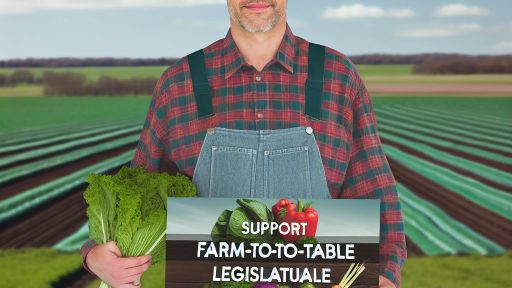Overview of Green Regulations in Agriculture
Definitions
Green regulations refer to rules aimed at promoting environmental sustainability in agriculture.
They focus on reducing pollution, conserving natural resources, and protecting biodiversity.
Farmers must comply with these regulations to minimize environmental impact.
Importance of Green Regulations
Green regulations play a crucial role in ensuring food safety and quality.
They help mitigate climate change by promoting practices that reduce greenhouse gas emissions.
Additionally, these regulations support sustainable land management and preserve ecosystems.
Benefits for Farmers
Complying with green regulations can lead to improved soil health and increased biodiversity.
Farmers benefit from better crop yields through sustainable practices.
Moreover, they can enhance their marketability to environmentally conscious consumers.
Challenges in Implementation
Despite the benefits, implementing green regulations can be challenging for farmers.
The initial costs for adopting new practices may deter some producers.
Additionally, there may be a lack of resources or knowledge about best practices.
Moving Forward
Governments and organizations must provide support and education to farmers.
Collaboration is essential for effective implementation of green regulations.
Ultimately, these efforts will lead to a more sustainable agricultural system.
Transform Your Agribusiness
Unlock your farm's potential with expert advice tailored to your needs. Get actionable steps that drive real results.
Get StartedLegal Framework
Analyzing Existing Green Regulations for Farming
The legal framework for green farming regulations is complex and multifaceted.
Governments worldwide implement various regulations aimed at promoting sustainable practices.
These regulations often address issues such as waste management, water usage, and pesticide application.
Primarily, they aim to reduce environmental impacts while supporting agricultural productivity.
Current Regulations in the United States
In the United States, several key legislative acts guide green farming practices.
The Clean Water Act regulates discharges of pollutants into U.S. waters.
Additionally, the Environmental Protection Agency (EPA) oversees water quality standards.
Moreover, the Federal Insecticide, Fungicide, and Rodenticide Act governs pesticide usage.
These regulations help to protect both the environment and public health.
European Union Regulations
The European Union (EU) employs a comprehensive set of policies for sustainable agriculture.
The Common Agricultural Policy (CAP) encourages eco-friendly farming methods.
It provides financial incentives to farmers adopting sustainable practices.
Furthermore, the EU’s Water Framework Directive aims to ensure clean water resources.
These regulations emphasize biodiversity and soil conservation across member states.
Challenges in Implementation
Despite existing regulations, implementation often encounters significant challenges.
Farmers may struggle with adherence due to unclear guidelines.
Additionally, resource constraints can hinder effective compliance.
Moreover, differing regulations across regions create confusion and inconsistencies.
Ultimately, these challenges can deter farmers from adopting green practices.
Benefits of Compliance
Despite the challenges, compliance with green regulations offers numerous benefits.
Firstly, it helps to improve soil health and water quality.
Secondly, farmers can enhance their marketability through eco-friendly branding.
Furthermore, sustainable practices often lead to long-term cost savings.
In addition, compliance can reduce liability and associated legal risks.
Showcase Your Farming Business
Publish your professional farming services profile on our blog for a one-time fee of $200 and reach a dedicated audience of farmers and agribusiness owners.
Publish Your ProfileBenefits of Implementing Green Regulations on Farms
Environmental Impact
Green regulations play a crucial role in minimizing environmental harm.
They help reduce pollution in soil, air, and water systems.
Furthermore, these regulations promote biodiversity and ecosystem health.
Farmers can significantly decrease their carbon footprint by adopting sustainable practices.
Additionally, green regulations encourage the use of renewable resources on farms.
As a result, farms become more resilient to climate change impacts.
Healthy ecosystems contribute to higher crop yields and better livestock health.
Sustainability
Implementing green regulations fosters long-term sustainability in agriculture.
Farmers can ensure that resources remain available for future generations.
This approach also supports economic viability alongside environmental stewardship.
Moreover, sustainable practices lead to healthier food products for consumers.
In the long run, investing in sustainability enhances farm profitability.
Notably, consumers increasingly prefer products from environmentally responsible farms.
This growing demand can open new markets and enhance brand loyalty.
Discover More: Enhancing Farm Resilience Through Climate Laws
Challenges and Barriers to Adoption
Financial Obstacles
Many farmers struggle with the initial costs of green technologies.
This financial burden can deter them from adopting sustainable practices.
Furthermore, access to financing options often remains limited.
Traditional lenders may hesitate to support environmentally friendly projects.
Additionally, unexpected expenses can arise during the transition period.
These uncertainties can strain already tight agricultural budgets.
Logistical Challenges
Implementing green regulations requires significant changes in operations.
Farmers face challenges in sourcing new materials and equipment.
These logistical hurdles can disrupt existing food supply chains.
Moreover, training staff on new practices adds another layer of complexity.
Seasonal cycles can make timely implementation difficult.
Consequently, farmers may experience delays in achieving sustainability goals.
Educational Barriers
Many farmers lack awareness of sustainable farming practices.
Without proper education, they may be skeptical about new technologies.
Information on these practices can be difficult to access.
Furthermore, extension services may not adequately cover green regulations.
This gap in knowledge limits farmers’ ability to make informed decisions.
Ultimately, educational initiatives must bridge this knowledge gap.
Find Out More: Applying for Bioenergy Incentives in Sustainable Farming
Case Studies of Successful Implementation
Riverside Organic Farm
Riverside Organic Farm has embraced sustainable practices successfully.
The farm implemented crop rotation to improve soil health.
Consequently, yield increased by 25% over two seasons.
They also use cover crops to prevent erosion.
This method enhances biodiversity on the farm.
Sunny Acres Dairy
Showcase Your Farming Business
Publish your professional farming services profile on our blog for a one-time fee of $200 and reach a dedicated audience of farmers and agribusiness owners.
Publish Your ProfileThey installed solar panels on their barn roofs.
This change reduced their energy costs significantly.
The energy generated powers their milking equipment.
As a result, they have become energy independent.
Green Valley Vineyard
Green Valley Vineyard focuses on water conservation.
They utilize drip irrigation systems to minimize water use.
This approach efficiently delivers water to each vine.
Additionally, they collect rainwater for irrigation.
This method has halved their water consumption.
Hilltop Vegetable Farm
Hilltop Vegetable Farm practices integrated pest management.
They use beneficial insects to control pests naturally.
This reduces the need for chemical pesticides.
The farm reports healthier crops and reduced costs.
Furthermore, this practice improves the ecosystem’s health.
Harvest Moon Community Supported Agriculture
Harvest Moon CSA promotes local produce through community engagement.
Their farm uses organic methods to grow vegetables.
They encourage members to participate in farming activities.
This involvement fosters a sense of community.
Additionally, it educates consumers about sustainable practices.
Discover More: Strategies For Farmers To Benefit From Trade Agreements

Technological Innovations Supporting Green Regulations
Precision Agriculture
Precision agriculture enhances farming efficiency and sustainability.
This method utilizes technology to monitor field variability.
Farmers use GPS and IoT devices for real-time data collection.
Consequently, they can apply inputs more accurately.
This reduces waste and minimizes environmental impact.
Environmental Monitoring Tools
Monitoring tools help farmers track environmental conditions.
For instance, soil sensors provide crucial data on moisture and nutrients.
Weather stations offer insights into local climatic conditions.
By utilizing this data, farmers can make informed decisions.
This leads to better crop yield and sustainability efforts.
Automated Systems
Automated systems streamline various farming operations.
Robotic systems assist in planting, weeding, and harvesting.
These technologies reduce manual labor and enhance efficiency.
Moreover, they can operate with precision, reducing chemical use.
This aligns with environmental regulations and promotes sustainability.
Biotechnology
Biotechnology offers innovative solutions for crop production.
Genetically modified organisms (GMOs) have improved resilience.
They can tolerate pests, diseases, and adverse weather conditions.
This technology leads to reduced pesticide use and enhanced yields.
Additionally, it supports food security and sustainable practices.
Showcase Your Farming Business
Publish your professional farming services profile on our blog for a one-time fee of $200 and reach a dedicated audience of farmers and agribusiness owners.
Publish Your ProfileRenewable Energy Sources
Renewable energy powers sustainable farming practices.
Farmers install solar panels to reduce electricity costs.
Wind turbines also provide an alternative energy source.
Utilizing renewable energy decreases carbon footprints.
Furthermore, it contributes to long-term sustainability goals.
Explore Further: Benefits Of Integrated Pest Management Strategies
Strategies for Farmer Engagement
Educational Programs
Educational programs play a crucial role in farmer engagement.
Workshops can provide farmers with valuable information on green regulations.
These programs should cover sustainable practices and compliance guidelines.
Furthermore, farmers benefit from hands-on training to implement green solutions.
Collaboration with local universities can enhance education delivery.
Having expert speakers can motivate farmers to adopt new practices.
Online resources can supplement traditional education methods.
These resources should be accessible and user-friendly.
Community members can help facilitate local training sessions as well.
This approach fosters a spirit of collaboration among farmers.
Community Involvement
Community involvement is essential for successful agricultural initiatives.
Forming local farming cooperatives can promote shared knowledge and resources.
These networks encourage discussions about best practices and challenges.
Farm tours can showcase successful implementations of green regulations.
Attending these events can inspire and inform local farmers.
Additionally, partnering with local governments can enhance support for farmers.
Public meetings can address concerns and gather feedback from the farming community.
Encouraging participation in community events can also foster engagement.
When farmers see tangible outcomes from their involvement, motivation increases.
This engagement ultimately leads to a more sustainable agricultural landscape.
Future of Green Regulations in Agriculture
Emerging Trends
Green regulations are evolving to meet environmental challenges.
Farmers are increasingly adopting sustainable practices.
Regenerative agriculture is gaining traction among producers.
Additionally, there’s a push for organic farming methods.
New technologies are emerging to monitor environmental impacts.
Predicted Policy Changes
Next, we expect significant shifts in agricultural policies.
Governments will likely impose stricter environmental standards.
Subsidies for eco-friendly farming are expected to increase.
Moreover, carbon credits may become a major incentive.
Regulatory frameworks will aim to reduce greenhouse gas emissions.
Impact on Farmers
These changes will fundamentally alter farming practices.
Farmers will need to adapt to new compliance requirements.
Training programs will become essential for successful transitions.
Investing in sustainability may lead to economic benefits.
Showcase Your Farming Business
Publish your professional farming services profile on our blog for a one-time fee of $200 and reach a dedicated audience of farmers and agribusiness owners.
Publish Your ProfileCollaboration among farmers will also rise in importance.
Global Considerations
International agreements will influence local regulations.
Countries may follow trends set by leading agricultural nations.
Trade agreements will likely incorporate green standards.
Sustainable practices will be crucial for global markets.
The ripple effects of these changes will impact food security globally.




